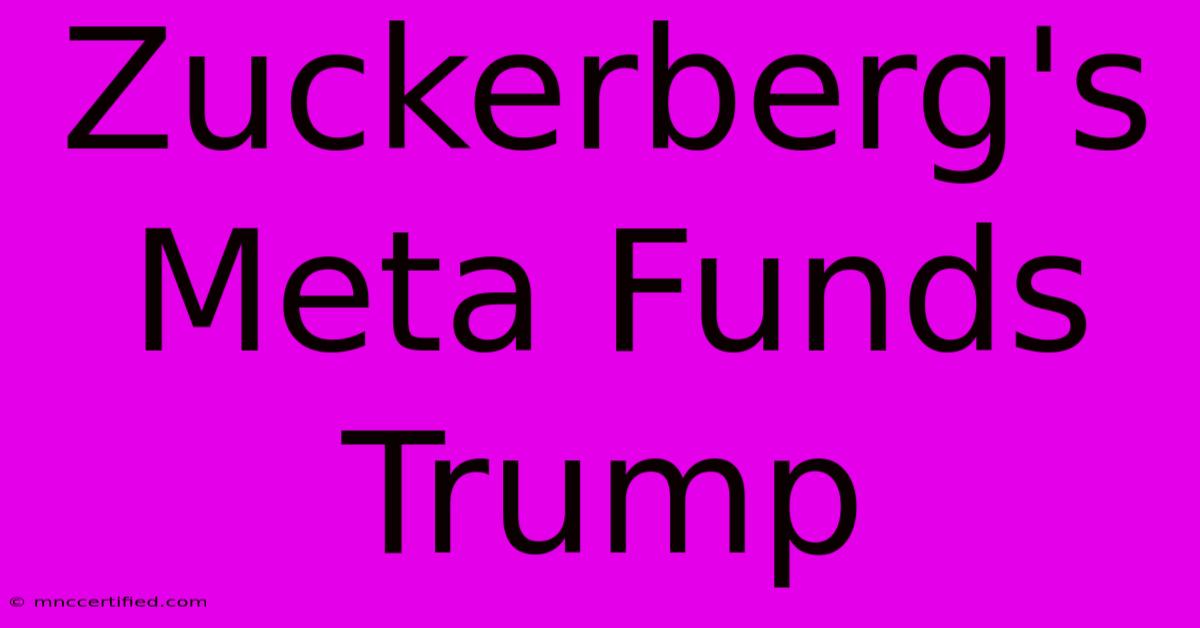Zuckerberg's Meta Funds Trump

Table of Contents
Zuckerberg's Meta Funds Trump: Fact-Checking the Claims and Exploring the Implications
The claim that Mark Zuckerberg's Meta Platforms (formerly Facebook) funded Donald Trump's political campaigns or initiatives has circulated online. This article will delve into the evidence surrounding these claims, examining their validity and exploring the broader implications of such allegations, focusing on the intersection of social media, politics, and campaign finance.
Separating Fact from Fiction: Evidence and Analysis
The assertion that Zuckerberg directly funneled money to Trump's campaigns lacks verifiable evidence. While Meta's political advertising policies have been scrutinized extensively, particularly regarding transparency and the spread of misinformation, there's no credible reporting or official documentation showing direct financial contributions from Zuckerberg to Trump.
However, the narrative often conflates several distinct aspects:
1. Political Advertising Spending on Meta Platforms:
Meta's platforms (Facebook and Instagram) are major channels for political advertising. Both Trump's campaigns and opposing groups spent significant sums on these platforms. This spending benefits Meta financially, but it doesn't constitute direct funding from Zuckerberg himself. This is a crucial distinction often missed in online discussions. The revenue Meta generates from political ads is separate from Zuckerberg's personal finances.
2. Allegations of Bias and Censorship:
Critics frequently accuse Meta of bias, either favoring or suppressing certain political viewpoints. These accusations often fuel the narrative of indirect support, suggesting that Meta's policies might inadvertently benefit Trump or hinder his opponents. However, proving direct causality between Meta's content moderation policies and electoral outcomes is exceptionally difficult.
3. The Role of Algorithms and Information Spread:
The algorithms governing Meta's platforms play a significant role in shaping what users see. Concerns exist about how these algorithms might amplify misinformation or promote certain political narratives, potentially benefiting one candidate over another. Again, while this is a legitimate area of concern regarding social media's impact on democracy, it doesn't equate to direct funding from Zuckerberg.
The Broader Implications: Campaign Finance and Transparency
The persistent circulation of these unfounded claims highlights crucial issues:
- The need for greater transparency in political advertising: While Meta has made efforts to improve transparency, the complexity of political advertising on its platforms and the potential for manipulation remain challenges.
- The influence of social media on elections: The role of social media in shaping public opinion and influencing electoral outcomes is undeniable, raising concerns about misinformation, foreign interference, and the need for better regulation.
- The spread of disinformation: False claims, like the one about Zuckerberg directly funding Trump, demonstrate the ease with which misinformation can spread online and the need for media literacy and critical thinking skills.
Conclusion: Context and Critical Evaluation are Key
While Mark Zuckerberg's Meta Platforms undeniably plays a significant role in the digital landscape and political discourse, the claim of direct funding for Donald Trump's campaigns remains unsupported by evidence. It's essential to critically evaluate information and separate fact from speculation when engaging with online narratives, particularly those concerning sensitive political topics. Focusing on the real issues of transparency in political advertising and the influence of social media algorithms on election outcomes is a far more productive approach than propagating unsubstantiated claims. This requires careful examination of evidence, skepticism towards sensationalist headlines, and a commitment to factual accuracy.

Thank you for visiting our website wich cover about Zuckerberg's Meta Funds Trump. We hope the information provided has been useful to you. Feel free to contact us if you have any questions or need further assistance. See you next time and dont miss to bookmark.
Featured Posts
-
Greenlaws Injury 49ers Vs Rams
Dec 13, 2024
-
Rainy Thursday Night Rams Win Over 49ers
Dec 13, 2024
-
Chelsea Dominates Astana 3 1 Review
Dec 13, 2024
-
Week 15 Player Props Rams 49ers Best Bets
Dec 13, 2024
-
Ollie Smiths Comeback Emerging Scotland
Dec 13, 2024